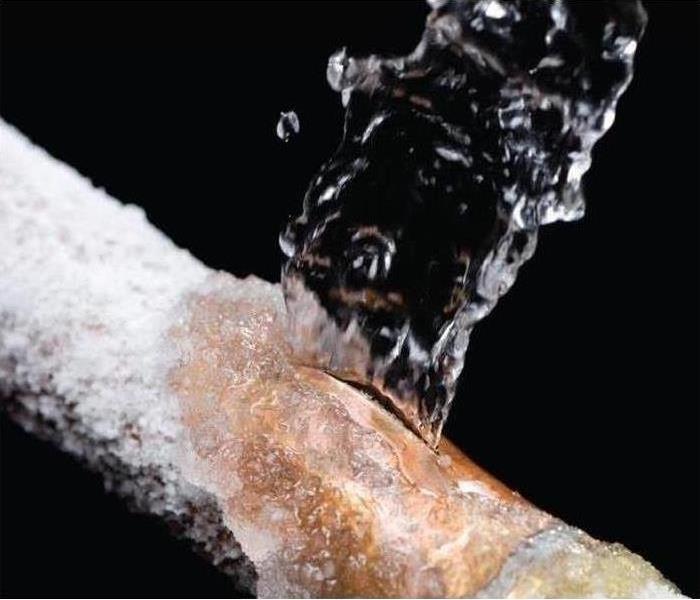Frozen Pipes: How To Avoid Freezing Pipes & What To Do If It Happens
11/13/2019 (Permalink)
As we all know, we recently had our first significant below freezing temperatures sweep over several areas in Maryland. It is not too late to better prepare for the risks that winter weather poses on your home and/or business.
As temperatures drop, water expands and freezes. Frozen water within pipes, whether they be plastic or metal, causes immense pressure build ups and can leave you with busted pipes and costly repairs. Although frozen pipes are a common occurrence, they are easily preventable.
SERVPRO offers these tips for preventing frozen pipes and mitigating any damage that they can cause.
Preventing Frozen Pipes:
- Disconnect any outdoor hoses
- Drain any in-ground irrigation systems
- Close any indoor valves that supply water outside and leave the outdoor valves open to allow for any excess water to drain out
- Caulk around pipes where they enter the house as well as any visible cracks on the interior and exterior of the property
- Add extra insulation to exposed pipes around the property. Pay close attention to pipes that are in unheated areas such as the basement, crawl space, attic, garage, etc.
- Maintain a consistent temperature throughout the inside of the property both day & night. This will give extra protection to pipes.
- In significantly low temperatures, let the faucet slightly drip- running water is much less likely to freeze.
- If expected to be away for an expected period of time leaving the property unattended, leave the heat on at a temperature no lower than 55° F
- Identify locations of shut-off valves in case of a burst pipe to quickly attend to the situation and lessen the potential water damage
Mitigating a Frozen Pipe:
- Leave water sources flowing as you are treating a frozen pipe- as water begins to flow it will help melt the ice within the pipe
- Gradually apply heat to the effected pipe. Consider using an electric heating pad to wrap the pipe, an electric hair dryer, a space heater set up at a safe distance from any flammable material, or wrapping a towel soaked with warm water around the pipe. Although it seems easier, do not use a blowtorch, a kerosene or propane heater, or any open flame device. These tools can cause even more damage and potentially start a fire.
- Apply the heat until you have restored and maintained full water pressure
- Call a licensed professional if you are unable to identify the frozen pipe, if the pipe is not accessible, or if you are unable to thaw the pipe
If a Pipe Bursts:
- Shut off the main water valve. Your shut off should be clearly marked with a tag of some sort. If it is not easily located, call SERVPRO of Queen Anne's, Kent & Caroline Counties to help.
It is critical that you treat any and all damage caused by frozen pipes- especially water damage. Water damage can lead to other issues including mold growth and structural damage. If your property has been effected by freezing temperatures, reach out to us right away! SERVPRO of Queen Anne's, Kent & Caroline Counties is here 24⁄7 to help you recover.





 24/7 Emergency Service
24/7 Emergency Service
